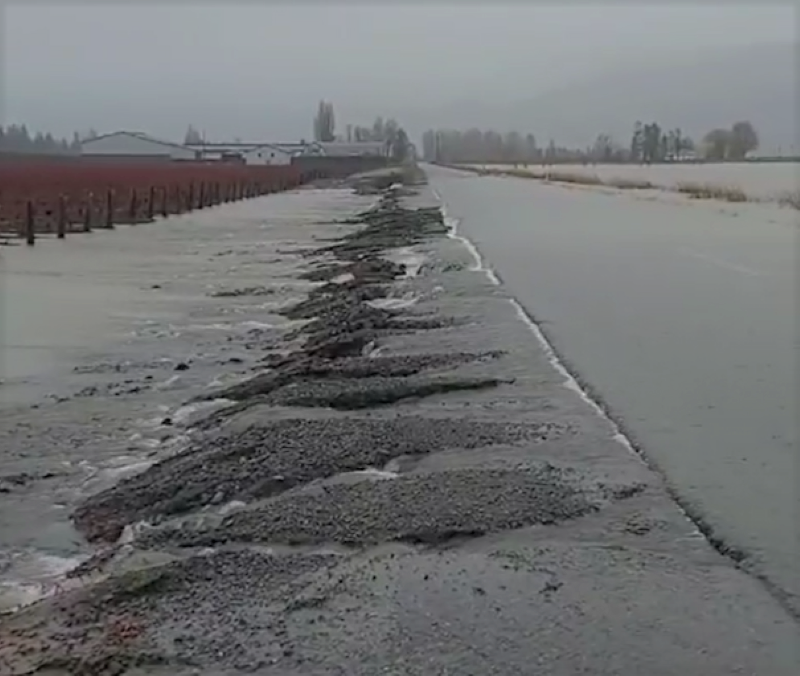Water from the Nooksack River south of the Canada-US border is heading north into Abbotsford, exacerbating the community's already deluged infrastructure.
During a Sunday, Nov. 28, Abbotsford's Mayor Henry Braun told media the city was as prepared as it could be, but nothing can stop the water that's on its way.
"The water finding its way across the border right now is a combination of rainwater and snowmelt and the strong overnight winds are continuing to push it towards Abbotsford," he said.
A two-foot sandbag barrier in Huntingdon, a small neighbourhood at the Sumas border crossing where about 90 properties were put on evacuation order overnight, is meant to redirect water away from dense areas and into fields, Braun noted, as the Nooksack River is too big to hold back.
"I don't know what's all south of the border, but sandbag walls are not going to stop the Nooksack, that river is 1/10 the size of the Fraser," he said, noting the geography means the floodwaters naturally head north.
"It's all pointed in our direction, that's the lay of the land, right to Barrowtown," he said.
As of the Sunday afternoon water was overtopping the Nooksack's dike near the community of Nooksack, south of Sumas, Washington. There are few barriers between the floodwaters and Abbotsford, and with already saturated fields Braun described the situation like filling an ice tray with water already in it, with water spilling over to the next area.
"The land is supersaturated," Braun said. "None of that water is going into the ground; it'll come here a lot faster than in the last event."
It's expected that water will arrive in Canada later on Sunday.
Meanwhile, in Abbotsford, another 100 mm of rain has fallen on the town, and the freezing level in the mountains has risen, meaning snow that fell during the past days is melting and joining the rainwater. The Barrowtown pump station is still running at full speed, but the floodwaters in Sumas Prairie rose Sunday, by about three inches. Saturday they had continued to decrease.
Despite the continuing rain event, Braun noted overall the situation had remained stable, as of the press conference's start, though flooding had been reported in Clayburn village.
With the dike along the Sumas Prairie higher than it was before the major rain event two weeks ago, Braun explained the city was as prepared as it could be, and had been working with Canadian forces, the provincial government and the federal government to deal with the situation.
"We're as ready as we can be, now we have to wait to see what happens," he said.
Earlier Sunday B.C.'s public safety minister, Mike Farnworth, noted the upcoming rain even expected this week may be the worst one yet.
"We're in the middle of one of the most intense series of storms that we have seen along coastal B.C.," he said during a press conference. "This is historic weather intensified by climate change."
He advised people to make sure they're prepared for the heavy rains which may arrive in Metro Â鶹´«Ã½Ó³»Tuesday.
“Once again, it's time to be ready, to be prepared for heavy rains that could worsen existing flooding or create new flooding and increase risk to our highways, advised Farnworth.
-- with files from Kristen Holliday



